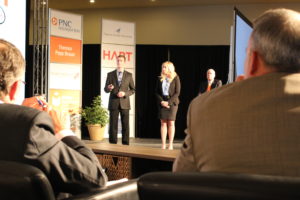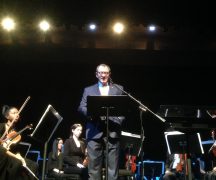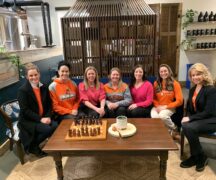By DAVID DUPONT
BG Independent News
Surrounded by music, lights, a wise-cracking master of ceremony, video projections of tweets, 11 university students got down to the serious business of pitching ways to make people’s lives better.
During Hatch 2016 Thursday night, those students presented eight projects to a five-member panel of Bowling Green State University alumni, who were ready to invest thousands of dollars to help these budding entrepreneurs launch their businesses.
Just about all those projects ended up walking away with an initial offer of money in exchange for a stake in the company, and a step closer to solving problems large and small, for people from preschoolers to elders, and everyone who uses water.

Kiersten Castner and Collin Newton make their case for their product to investors at The Hatch.
For Kiersten Castner and Collin Newton, their Trace Case would help people prone to losing their credit cards keep track of them.
For Alyssa Batch, her Comfort Covers would employ key words and symbols to foster conversations between people suffering from dementia and their families, friends and caregivers.
For Jarrod Cain, his StuPro Match would help college students find the professor who best matches their learning styles.
For Baqer Aljabr and Ryan Murphy, their Park Shark would lower costs for airports, universities and others managing massive parking lots with a robot that gives tickets and provides video surveillance.
For Meredith Moore and Khory Katz, their Easy-Loft Beds would help college students expand the living space in their dorm rooms.
For Sophia Schmitz, her Play-to-Play interactive board game will help music students as young as preschoolers learn their note names and other basics.
For Austin Farrington, his Trac Band would allow elders more freedom of movement in care centers while helping staff monitor their safety.
For Giuseppe Giammanco, his Microgreens would provide an alternative to plastic microbeads used in a large range of cosmetic products. Those microbeads have now been banned by the federal government because they pollute waterways. Giammanco created a green alternative that has all the capabilities of the existing product.
Giammanco got the $10,000 investment in exchange for a 10- percent share of the business. This will go for legal expenses and producing prototype product. Beyond that, he said, the company will generate revenue by licensing its product to industry giants such as Procter & Gamble.
As far as he could tell, no one else has come up with a replacement for the plastic microbeads.
But the panel of investors didn’t just smile and hand over the money. They had questions.
Michelle Drerup, the director of Behavioral Sleep Medicine at the Cleveland Clinic Sleep Disorders Center, wondered why Pinterest followers couldn’t just make their own Comfort Covers. Batch said that she would maintain proprietary rights to product.
The investors felt her idea needed more refinement, so they put in $7,500 for a 5-percent share to allow her to work with the business incubation firm Balance Inc. in Cleveland. The incubation option was a new twist in this year’s event.
Batch did win the Hatch’s Eggy, the event’s people’s choice award.
Brian Sokol, founder of The Idea Institute and now CEO of Enduring Wellness, called The Park Shark “kind of a narc thing” and worried for the six-wheeled robot’s safety.
Aljabr and Murphy explained that the robot was programmed to avoid people and did have a video camera to record anything that happened.
But Nico Cottone, owner and CEO of SurfTech Inc. and Euclid Refinishing Company, said while he appreciated the idea, he felt it needed ‘more refinement.” Joe Fisch, president and CEO of United States Beverage, wondered how Park Shark fit in the atmosphere of rapidly developing drone technology.
The robot ended up coming away with no investors. Aljabr and Murphy, though, have one institution interested in testing the concept.
Cain also walked away with no investment, but only because he turned down a deal. He already has an agreement to work with BGSU to try out his student-professor matching system.
As master of ceremonies Kirk Kern, who directs the Dallas-Hamilton Center for Entrepreneurial Leadership, said: “It’s business, not personal.”
“Don’t give up on your ideas,” Earl Malm, an investment executive , advised all the “Hatchlings” at the beginning. “Keep going.”
The investors also had ideas for further marketing of the product. Sokol said that the Easy-Loft Bed would be a great solution for people living in small apartments and may be a good fit for Ikea.
Malm suggested to Cain that students would be willing pony up to have his StuPro available to them.
The Hatch, based on the television show “The Shark Tank,” had a large audience extending far beyond the student union ballroom. Kern said 201 Hatch watch parties were being held throughout in 28 counties in Ohio and in 15 other states and as far away as South Korea.





